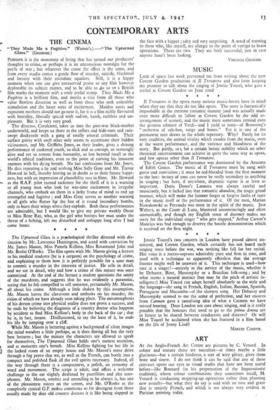CONTEMPORARY ARTS
THE CINEMA
" They Made Me a Fugitive." (Warner's.) " The Upturned Glass." (Gaumont.)
PERHAPS it is the monotony of living that has turned our producers' thoughts to crime, or perhaps it is an unconscious nostalgia for the perils of war ; but whatever the cause the effect is the same, and from every studio comes a gentle flow of murder, suicide, blackmail and larceny with their attendant squalors. Still, it is a happy moment when one can give unreserved praise to any film however deplorable its subject matter, and to be able to Jo so td a British film marks the moment with a truly joyful stamp. They Made Me a Fugitive is a brilliant film, and merits a visit from all those who value flawless direction as well as from those who seek unhealthy stimulation and the baser sorts of excitement. Maiden aunts and expectant mothers should not go near it, for it is a film richly flavoured with brutality, liberally spiced with sadism, harsh, ruthless and un- pleasant. But it is very very good.
The director, Cavalcanti, takes us into the post-war black-market underworld, and keeps us there in the cellars and hide-outs and rain- swept dockyards with a gang of totally amoral criminals. Their surface gaiety with each other only seems to accentuate their hidden viciousness, and Mr. Griffiths Jones, as their leader, gives a shining performance of cankered youth, so slick and so corrupt, so seemingly- alive and yet so remote from humanity, so lost beyond recall to the world's ethical traditions, even to the point of cursing his innocent enemies with his dying breath. No last confessions from Mr. Jones. He dies repeating a lie and wishing Miss Sally Gray and Mr. Trevor Howard in hell, thereby leaving us in doubt as to their future happi- ness, but with an impression of plausibility rare in films. Mr. Howard • as the R.A.F. pilot turned racketeer for the thrill of it is a warning to all young men who look for war-time excitement in irregular channels, who embark on them in a larky frame of mind to end up revengeful and fugitive ; and Miss Gray serves as another warning to all girls who flutter fur the fun of it round incendiary bombs, only to burn their wings when they explode. Both these performances are admirable, but I would like to give my private weekly Oscar to Miss Rene Ray, who, as the girl who betrays her man under the threat of a belting, left me disturbed and unhappy long after I had come home.
* * * *
The Upturned Glass is a psychological thriller directed with dis- tinction by. Mr. Lawrence Huntington, and acted with conviction by Mr. James Mason, Miss Pamela Kellino, Miss Rosamund John and Mr. Brefni O'Rorke. The film opens with Mr. Mason giving a lecture to his medical students (he is a surgeon) on the psychology of crime, and explaining to them how it is perfectly possible for a sane man to commit a murder in the interests of justice. He tells in detail, and we see in detail, why and how a crime of this nature was once committed. At the end of the lecture a student questions the sanity of the murderers- and suggests that he was evidently a paranoiac, seeing that he felt compelled to tell someone, presumably Mr. Mason, all about his crime. Although a little shaken by this assumption, Mr. Mason leaves the classroom and embarks on his murder, the vision of which we have already seen taking place. The metamorphosis of his dream crime into physical reality does not prove a success, and he ends by believiar7° the diagnosis of a country doctor who happens by accident to find Miss Kellino's body in the back of the car ; that he is, in fact, insane. • Disillusioned, to say the least of it, he ends his life by jumping over a cliff.
While Mr. Mason is lecturing against a background of silent images the mind wanders a little perhaps, as it does during all but the very best lectures ; but the minute the characters are allowed to speak for themselves, The Upturned Glass holds one's earnest attention, and at moments one's breath. Miss Kellino fighting for her life in the locked .room of an empty house and Mri 'Mason's tense drive through a fog prove that we, as well as the French, can bottle into a compact and polished flask all the evil spirits necessary. Indeed, all the way through there is a compactness, a polish, an economy of word and movement. The script is adult, and offers a welcome challenge to the ear slightly deafened by puerilities and alto saxo- phones. Mr. Mason, sombre and unsmiling as he always is has one of the pleasantest voices on the screen, and Mr. O'Rorke as the completely cynical G.P. makes comments so far divergent from those usually made by dear old country doctors it is like being slapped in the face with a kipper ; salty and very surprising. A word of warning to those who, like myself, are allergic to the point of vertigo to brain operations. There are two. They are both successful, just in case
VIRGINIA GRAHAM.






































 Previous page
Previous page